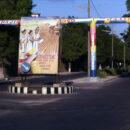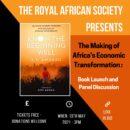Darfur: Understanding the Political Identity of Saviors
Alex de Waal will likely prove right over the controversy that will surround Mahmood Mamdani’s reframing of the conflict in Darfur. Particularly from the perspective of human rights advocacy (not to mention R2P advocates who display an alarming faith in the use of force as an international mechanism of rescue), Saviors and Survivors begins and ends making a case for what only a minority concerned with the conflict have been willing to say. What we’re witnessing in Darfur is not genocide. Accounts of violence and figures of attrition have been consistently distorted by the very activists from whom we might expect politically informed advocacy. The animus of political conscience itself – concern for people exposed to state violence, defense of defenseless populations, ethical clarity in the face of political obfuscation – have, in the case of Darfur, been purloined. We have reached a moment in which, as Mamdani puts it, the rights that were once the tools of people resisting the unchecked power of states have become instruments wielded by great powers to checkmate their targets.

At the center of Mamdani’s analysis is the triangular relationship between political identity, ecology, and regional (historical) geopolitics. We will not be unfamiliar with these themes, given that political identity has been one of Professor Mamdani’s central preoccupations, a red thread that runs through his work on postcolonial state formation, through his thinking on the Cold War roots of the war on terror in Good Muslim Bad Muslim, and into the current project. That these logics run through the range of problems he’s treated is testimony to the flexibility of these political instruments.
But we would be mistaken to read Saviors and Survivors as a straightforward continuation of his past intellectual pursuits – an application of his theoretical model to Darfur. Mamdani allows the empirical details of his subject matter to shape his analysis, often against common wisdom that molds its subject matter to pre-fabricated analytical frames. The damage that these ready-at-hand explanations have done to thinking on political violence has been remarkable. But with Darfur, they have caught the sails of an international advocacy that is peculiar to this African conflict.
Picking up a theme from a series of articles that preceded the book, Mamdani ponders why Darfur, and not Iraq, or, for that matter, the conflict in the DRC, has attracted singular attention of this kind. It is here, I think, that he lays a theoretical foundation for further inquiry into the logic of rescue, and it’s implied political agent, the savior. Not only does understanding this figure (the salvatory supplement to the bystander in Raul Hildberg’s perpetrator-victim-bystander triad) illuminate key subjective logics of contemporary humanitarianism. It also places this question within larger debates on cosmopolitanism, and the grounds for universal ethics. The stakes of Darfur start looking high well outside Africa, but not in the way the Save Darfur Coalition might assume.
I would suggest that Mamdani’s previous work on the politicization of identity invites us to read these sections of the book as the beginning of a reflection on the savior (in the figure of the international activist, as well as of humanitarian professional, for instance) as under-girded by a particular political identity in its own right. Too little thinking has been done on precisely what are the grounds of this identity, and what kind of community sustains political activity undertaken under the logic of rescue. We must ask whether common humanity is appealing precisely because it obscures other, more unpleasant connections (like the concrete implications of American citizens to Iraq that Mamdani points out, or the vast networks of petrol and carbon consumption that link what we can do “here” to aggravating political and ecological developments across the Sahel). Although it is not the central concern of Saviors and Survivors, Mamdani gives us a groundwork.
He remarks on the strategy of the Save Darfur coalition as one that puts the violence in Darfur, in the words of Bob Geldof “on the same continuum as “˜Auschwitz and Srebrenica.'” The pervasive Framing of Darfur as a historical event that calls on a common humanity to make the refrain “never again” a reality, Mamdani asserts, relies on the separation of moral from political sensibilities, demanding that we privilege moral urgency when the political complexities of conflict might counsel slow, patient analysis.
An important implication of this divorce of moral from political responses to conflict is that emphasis on moral convictions short circuits the political relationship between international activists motivated by the logic of rescue and the Darfurians on whose behalf they intervene. Being asked to commit to a higher cause, the only commonality between the two is a shared humanity, and a dangerously truncated imagination of what that commonality consists of: a generalized vulnerability. In this logic the history of Auschwitz and Srebrenica loom larger than the political history of Darfur in understanding Darfur itself.
Hence, when saviors meet victims, they do not meet in a political relation based on the imagination of a common future. Indeed, precious little literature coming from the activist community surrounding the Save Darfur coalition is sensitive to the complexities of what it might mean to think through a common Sudanese future, a dangerous side effect of the splitting of the conflict into clear victims and perpetrators. Nor do we have a political solidarity based in concrete connection with people living in the wake of the complicated, and often-violent histories of colonial land-tenure arrangements, and the strategic position of Darfur in the politics of the cold war. Instead we have a contingent, immediate engagement, filled with an oversaturated fixation on the present (understandable, if nonetheless irresponsible, in an emergency), one which can in a sudden and intense surge of interventionary zeal transform the fabric of lived reality in Darfur (see reports on Urbanization on this Blog by Alex de Waal and Manuel Herz, for instance, to get a sense of such changes) before moving on to the next location.
Thankfully, this description does not describe all international humanitarian activity in Darfur (although the shameful adventurism of the ICC indictment last month is a symptom of the worst tendencies in the zealous international savior). The middle section of Mamdani’s book on recontextualizing Darfur offers a remedy to this two dimensional picture of Darfur, after which he returns to the current conflict in order to rethink it historically. It is here that a larger question about the politics of rescue comes into full focus. I hope, and expect, that many in the community of scholars and activist on humanitarianism will welcome this critical analysis as the opening of a discussion, rather than rejecting it as an attack.
Manuel Schwab is a PhD Candidate, Columbia University, researching the economies and politics of humanitarian interventions in Sudan.





